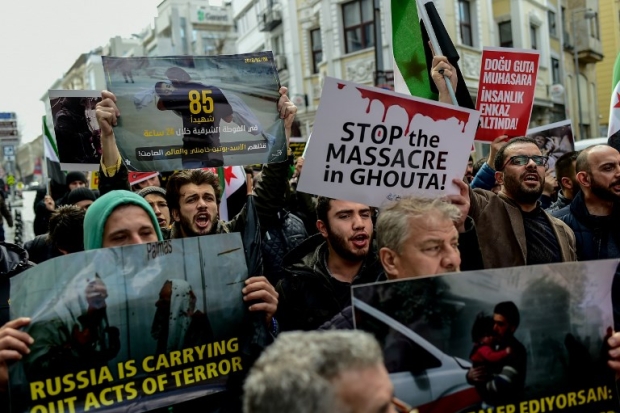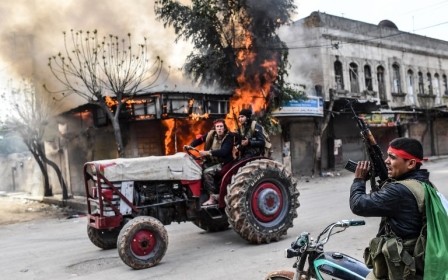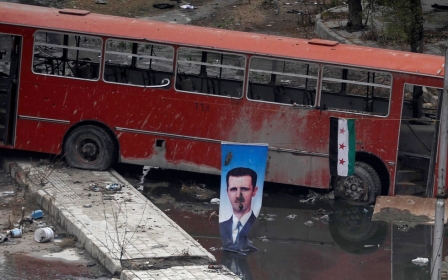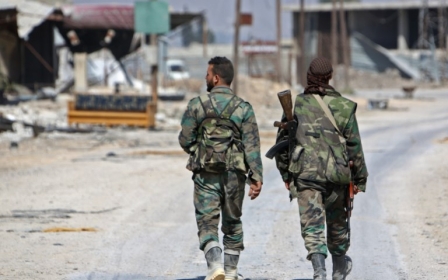Even if he 'wins,' Assad has lost Syria
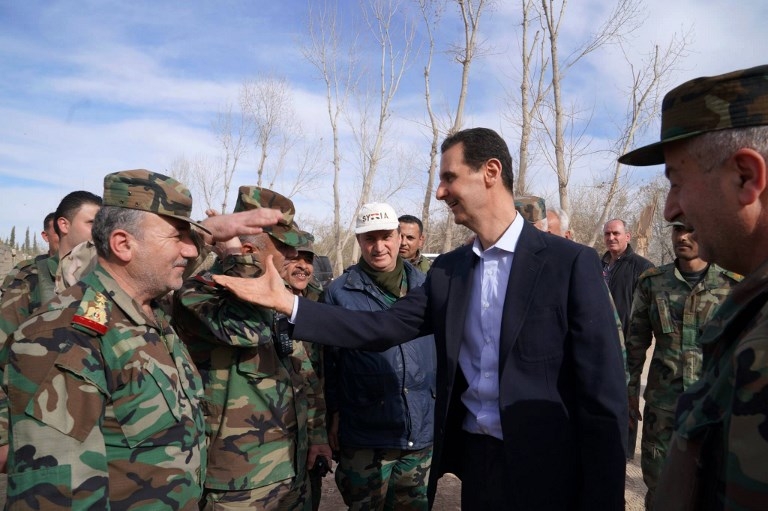
As a horrific endgame unfolds in Eastern Ghouta, where Syrian government forces are moving to oust Jabhat al-Nusra and other rebel factions, the tide of war seems to have turned in President Bashar al-Assad's favour.
Government forces, backed by Russian and Iran, are cementing their control over the areas surrounding Damascus, including Ghouta. With such a seismic reversal of fortunes, Assad appears to be on top once again, while the revolution looks to be dead or dying.
However, such a view is simplistic at best, as the realities on the ground paint a very different picture. Even if Assad succeeds in clearing the surrounding areas of Damascus of his enemies, and even if he succeeds in entrenching his forces in Aleppo and retaking the last major rebel stronghold of Idlib, the question of retaking the rest of Syria remains far from certain.
Turkish and American interests
To the north, Turkish forces have crossed the border and surrounded Afrin, with a view to maintaining some sort of presence to prevent a resurgence of the People's Protection Units (YPG).
The Turkish postal service has begun operations in Turkish-controlled areas of northern Syria, and Turkish city planning companies have won contracts to rebuild towns, including al-Bab.
Schools and hospitals run by Turkey have emerged, alongside evidence of the imposition of a Turkish education curriculum. Assad's frustration at Turkish activity is evident, amid reports of his providing assistance to the Kurds to resist the Turks.
With these four forces entrenched in Syria, it is difficult to see how far regime forces can go towards retaking Syria
Also in the north, US forces are in Manbij, with air force capabilities via the Incirlik military base in Turkey. Although relations between Turkey and the US are tense amid US support for the Kurds, the Americans have made it clear that they will not abandon their interests in Syria, even if the Kurds become unusable.
The US demonstrated its readiness to push back against Russia by striking Russian troops in February, reportedly killing dozens, including Russian nationals.
Russia's playing down of the incident spoke volumes not only of Russia's reluctance to engage in an open conflict with the US in Syria but also of the limitations it has set on its own operations. The aim is not the revival of Assad, but the prevention of an American proxy. Moscow can accept a balance of power, but not one that leans heavily towards Washington.
Expanding the Shia Crescent
Then there is Iran, whose forces operate amid the Iraqi militias who "patrol" the southeast. These groups were essential in the early days of the conflict, before Russian intervention, by successfully resisting rebel forces and liaising with Hezbollah in Lebanon to deliver a decisive blow to the Free Syrian Army in Qusayr in 2013.
Having crushed Kurdish dreams of independence domestically and eradicated Islamic State (IS) enclaves in Iraq, these militias continue to use the pretext of fighting terrorism to maintain a presence in Syria.
Assad's need for these forces to exert control over Syria presents its own problems. He cannot realistically ask them to leave. Moreover, any potential antagonism towards Iran is restricted by the geographic pincer through which Tehran can keep Assad in check. With Hezbollah in the west and militias in the east, both not too far from Damascus, Assad is effectively held ransom - a situation that is compounded by the absence of a credible Syrian army.
Meanwhile, the Russians have cemented their presence in Hmeimim and Tartus. Foreign intervention always comes with a price, and Syria will be expected to pay a hefty one for all the effort Russia has put into rescuing the regime.
Russian influence in the 'deep state'
However, the relationship with Russia is much more complex. For one, Assad is not indispensable to Moscow and remains a bargaining chip on the negotiating table.
Russia is known for being flexible with its foreign policy, backing the Kurdistan Workers' Party (PKK) today and abandoning it tomorrow in favour of warmer relations with Ankara; threatening to destroy Saudi Arabia and Qatar before bolstering bilateral economic ties to capitalise on regional distrust towards the US.
For Russia, the main aim is to rebuild state institutions in Syria, establishing Russian influence in the "deep state".
Secondly, Russia and Iran are not natural allies, and although they share a mutual interest in protecting the regime, they are at odds over what the "regime" actually entails. Iran seeks to preserve Assad, while Russia does not.
Moreover, Russia seeks to preserve the integrity of the Syrian state by retaking as much territory as possible. Russia is also keen to capitalise on the regional discontent towards the US by developing warm relations with Iran’s enemies, including Saudi Arabia.
Hollow victories
With these four forces entrenched in Syria, it is difficult to see how far government forces can go towards retaking Syria. These forces are not strong enough to fight against Turkish army and are unlikely to be able to rely on Russia, Turkey’s current ally, to help in this endeavour.
They also lack the capabilities to fight US forces in Manbij. Government forces are hamstrung by Iran's militias and dare not switch on the decisive power of the Russian air force, which turned the tables in favour of Assad in the first place.
This means that Assad has no leverage to coax Russia and Iran into an open conflict with the US and the Turks. Therefore, as it stands, Assad’s apparent resurgence is more a fallacy than a reality, and his victories can only be described as hollow at best.
- Sami Hamdi is the editor-in-chief of the International Interest. An experienced geopolitical risk consultant, he has extensive experience in the MENA region, having been a television reporter and talk-show host for over 10 years.
The views expressed in this article belong to the author and do not necessarily reflect the editorial policy of Middle East Eye.
Photo: Syrian President Bashar al-Assad shakes hands with government troops in Eastern Ghouta on 18 March 2018 [HO/Syrian Presidency Facebook page/AFP]
Middle East Eye propose une couverture et une analyse indépendantes et incomparables du Moyen-Orient, de l’Afrique du Nord et d’autres régions du monde. Pour en savoir plus sur la reprise de ce contenu et les frais qui s’appliquent, veuillez remplir ce formulaire [en anglais]. Pour en savoir plus sur MEE, cliquez ici [en anglais].



